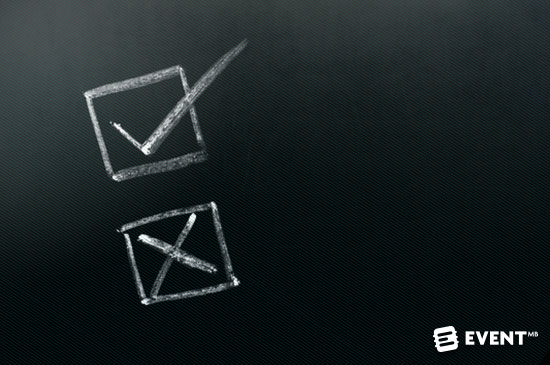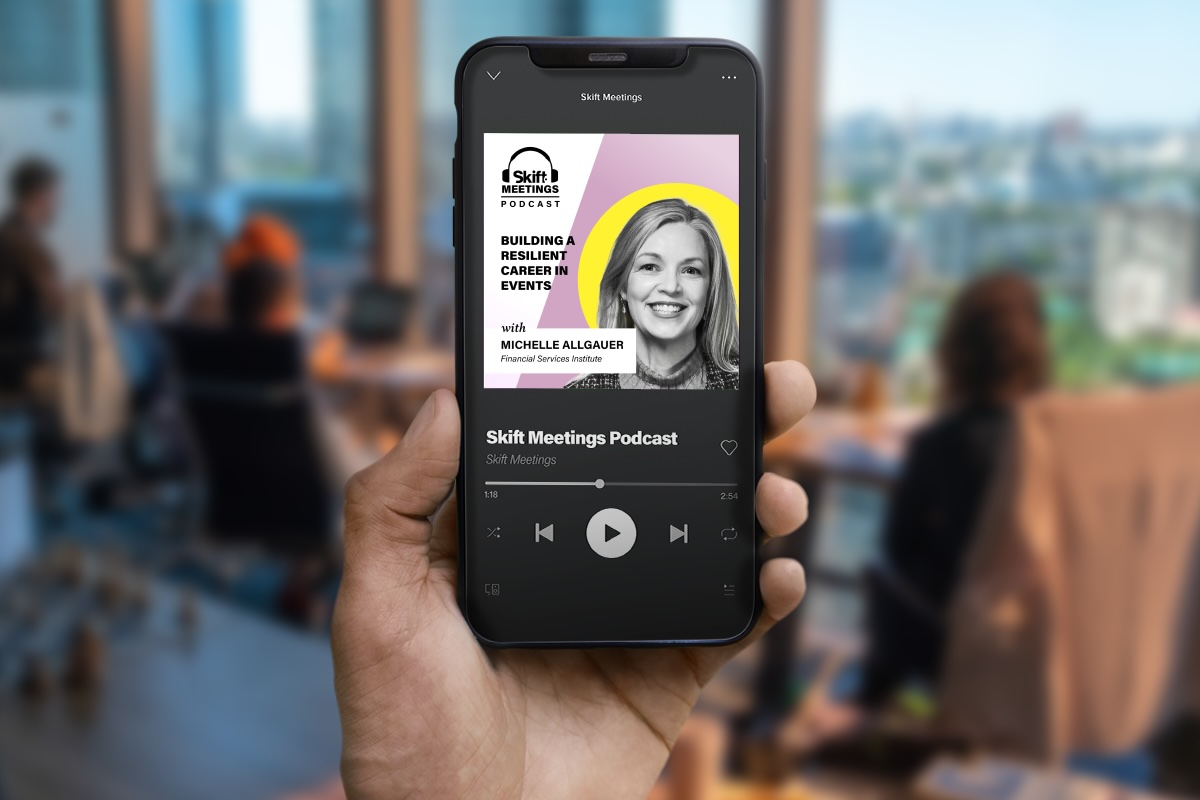As an event planner there are ways to do things in the correct way and things you should never do. Here is the unwritten event etiquette rules every good eventprof should follow.
Event etiquette is important to ensure you do not overstep your boundaries or get a reputation for being unprofessional. Below are a few things you may want to review to ensure you only get talked about for the right reasons.
Make a Good First Impression
A lot of times eventprofs can be extremely stressed out or seem high-strung on the days leading up to the event taking place. Be sure to greet everyone you are working with, as well as people you may have never met and don’t let them know how under pressure you are.
It is important to remember proper greeting etiquette as the planner. You can easily get a bad reputation for not being kind and polite to others on the show floor or not being accessible enough. Go over greeting etiquette with your team and read body language. Some people may not want to be hugged, air kissed or even shake hands and expectations will vary according to the type of event (B2B or B2C), the audience, international traditions and culture. It’s smart to research the right and wrong way of greeting people, and a great rule of thumb to role play greeting people with the events team so everyone is on the same page.
International Etiquette
Be aware that traditions differ between countries and cultures. If you are running an international event or have an international audience, be sure to familiarize yourself with some traditions and basic understandings before jumping on that plane! For instance did you know that in some countries there are different meanings to nodding and shaking your head? Avoid using these types of gestures with attendees from Greece, Sicily, Turkey, Macedonia and Bulgaria, otherwise it may cause confusion and offense!
International events around the world can be planned very differently. A few ways where you may see a difference could be check-in etiquette, dining etiquette and speaker etiquette. Stateside check-in may be as simple as typing your name into a kiosk and getting your badge, whereas overseas you may need to be more official by providing ID. Be sure you have reviewed proper etiquette for how to check people in with your team, and any other international differences they may need to be aware of.
Timing is Everything
One thing you should always do as an event planner is give ample timing on everything and be punctual yourself. Timing is essential to all moving parts that make up an event. When pre-planning for any event, be sure you fully understand what time you need to arrive to meet vendors, speakers, or any set-up responsibilities you may have. It’s important that the event planner is the first person on the job – no matter how small or large the job is in order to be respectful and get things done in a timely fashion. Everyone has deadlines and appreciates the courtesy shown.
It’s also the event planner’s job to communicate with vendors in a timely manner so that they know when they can arrive onsite at the event, when they can tear down, and where you need them to be. Planning out timelines will not only make you feel less stressed, but it will help you and your events team come across as super professional, respectful and punctual to work with.
Stay Professional
The top rule for good etiquette is to be mindful of other people’s feelings. This comes naturally to most planners as they want their guests to have the best experience. If you see an attendee looking lost and alone make the effort to introduce them to a friendly group and if you can see someone is uncomfortable with something rethink your approach.
A lot of times you may come across very moody vendors, or needy attendees who just need to be reassured everything will be ok. As the event planner it is your responsibility to make sure everyone feels happy and knowledgeable at the event. It’s your job to ensure everyone at the event walks away with good feedback – otherwise any bad feedback you receive may end up hurting you in the long run.
Be Smart with Your SmartPhone
An event planners smartphone is their lifeline. It can seem like it is smoking hot with all the calls, emails, texts, apps, search and updates we rely on our phones for. Times have changed and we no longer request that participants switch off their phones at the start of the event. Not only are they so important to the attendee they are often critical to run your event engagement technology. However, even though they are an essential part of modern life there are still some unspoken rules you should follow as an event planner. Most importantly always switch your phone to vibrate when in an event situation. Noone else needs to be disturbed by your incoming calls and notifications and it looks mighty unprofessional if interruptions to an event come from the event organizer!
If you are speaking to someone be sure to look them in the eye and give them your full attention, don’t distractedly be looking at your phone or tablet in the middle of a conversation. When you need to take a call do so in a private place and be respectful that you are not disturbing anyone or saying anything that shouldn’t be overheard.
Invitations, RSVPs and Thank yous
You know how infuriating it is when your guests don’t reply to your invitation to let you know whether they are attending your event? Or when they send apologies super late? This is the height of bad manners so don’t fall into the same traps as your attendees. As an event planner you know better than anyone the knock on effect late RSVPs and notifications can have so always lead by good example.
Likewise at certain events such as dinners, parties, golf events and corporate hospitality you are expected to thank the host personally for inviting you and perhaps even follow up with a handwritten letter, or at the very least an email in today’s modern times, following the event.
Boundaries Have a Purpose
One thing you should make sure you never do while planning an event is overstepping your boundaries. This may not make sense for new event planners, but for any veteran who has gone through the ropes of planning an event, he or she will know it’s never ok to jump on tasks that need approval. For example, if a sponsor wants to switch booth locations and you decide it’s ok and approve this for them, you can create a stir of heated emotions from other sponsors who did not receive those same benefits. It’s never OK to assume anything at an event. Always triple check with every party included before saying that golden word – approved.
Another example of boundary stepping might be moving a speaker from one date and time to another. Unless they are switching with someone who actually wants to make the switch, never sign off of these types of requests. Speakers and sponsors pay big dollars to get slotted in specific timeframes to speak at events. Again, never assume, always ask the stakeholders involved and then proceed.
Table Manners
Whether you are enjoying a formal networking 3-course meal yourself or running a dinner for your guests you need to be aware of dining etiquette. This is more than knowing your wine glass from your water glass and which utensils to use, having good table manners is vital for giving a good impression.
If you are the host and it isn’t clear from the seating plan, make this clear to the F&B staff so they know who is their contact and that they should serve everyone else first (particularly important for females hosts). At a formal dinner it is expected that everyone around the table should introduce themselves at the start of the meal and conversation should be kept to small talk, never turning to politics, religion and inappropriate jokes or comments.
Put on a Poker Face
If there is absolutely one thing to never do as an event planner, it’s speaking out of line or showing negative emotions to your extended team, partners (vendors, contractors), or even worse to your attendees. Having a bad attitude as the event planner will get you nowhere. Negative actions can easily be spread by word of mouth to everyone at the event, which not only makes you look bad, but the overall event will get a bad review.
If you find yourself feeling stressed or distraught by elements of your event hold them in until you are alone back at your hotel or home. A few examples that could cause event planners to feel outraged may be vendors not showing up on time, a slow start on the first day of the event – which can cause a chain reaction to slow down all sessions for the day, or food and beverage catering not arriving with the correct orders you placed. All of these may seem like easy fixes, but for a planner who has been working on these items for months they can stress you out, especially after triple checking that all was correct prior to the event start date.
Remember to keep your cool, and as mentioned before never let negative emotions show. Go home at the end of the day and cool down in private. Just keep in mind you are the event planner, and people look to you to fix any issues, so keep a smile on your face and take a deep breath when issues pop up – everyone makes mistakes so don’t take it out on them or yourself.
In Conclusion
There are lots of etiquette do’s and dont’s event planners should keep in mind while planning events. Remember to stay positive, communicate clearly and be professional at all times to ensure a successful event for everyone. A good attitude and proper etiquette only makes you stronger as a planner and respected by everyone you come into contact with.





